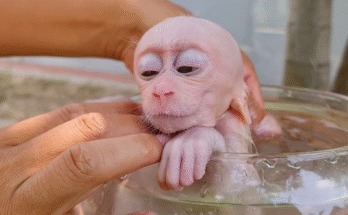Training monkeys at home enhances their natural intelligence and strengthens the bond between caregiver and animal. Focus on activities like problem-solving games, using puzzle feeders, and teaching simple tasks through positive reinforcement. Provide a stimulating environment with interactive toys, varied challenges, and regular social interaction. Structured training sessions build cognitive skills, while rewarding good behavior fosters learning. This approach not only improves the monkey’s quality of life but also showcases their impressive capabilities, making them more engaging companions.
Tiniest World Newborn Baby Monkey Hug Himself To Sleep Not Yet Accept New Home
Caring for a newborn monkey requires patience, knowledge, and attention to detail. These delicate creatures need a warm environment to regulate their body temperature, especially during the first weeks of life. Proper feeding is crucial; consult a veterinarian to ensure the formula matches their nutritional needs. Hydration and hygiene are equally important to prevent infections. Weak newborns may require extra care, including round-the-clock monitoring and gentle handling. Building trust through touch and communication is key to their emotional well-being. By providing the right care, you ensure the monkey’s healthy growth and create a strong bond for life.
How to Care for Monkeys: Essential Guidelines
Caring for monkeys is a serious responsibility that requires commitment, knowledge, and resources. Monkeys are highly intelligent, social, and complex animals, making them unique and challenging to care for. Below are the essential aspects of monkey care that every prospective caregiver should know.
1. Understanding Monkey Behavior and Needs
Monkeys are social creatures that thrive in groups. In the wild, they spend their days foraging, climbing, and interacting with their troop. To care for them properly:
- Social Interaction: Monkeys require constant interaction, either with humans or other monkeys, to prevent loneliness and stress.
- Mental Stimulation: Provide toys, puzzles, and varied activities to keep their minds engaged.
- Physical Activity: Ensure ample space for climbing, swinging, and moving around, as they are naturally active animals.
2. Legal Considerations and Ethical Responsibility
Before acquiring a monkey, it is crucial to:
- Check Local Laws: Ownership of monkeys is restricted or regulated in many areas. Obtain any necessary permits.
- Understand Ethical Implications: Monkeys are not domesticated animals, and taking them from their natural habitat can harm wild populations.
- Commit Long-Term: Monkeys can live for decades, so caring for them is a lifelong commitment.
3. Housing Requirements
Monkeys need spacious and secure enclosures. The ideal habitat should include:
- Adequate Space: Enclosures must be large enough to allow climbing, jumping, and exploring.
- Safety Measures: Use sturdy materials to prevent escapes and ensure protection from predators.
- Enrichment Features: Include ropes, branches, platforms, and hiding spots to mimic a natural environment.
- Hygiene: Clean the enclosure regularly to prevent disease.
4. Proper Nutrition
A monkey’s diet should be diverse and balanced. Key components include:
- Fruits and Vegetables: These form the bulk of their diet, providing essential vitamins and minerals.
- Protein Sources: Include nuts, seeds, eggs, and occasionally insects.
- Specialized Monkey Chow: Commercially available monkey food ensures they receive necessary nutrients.
- Fresh Water: Provide clean, fresh water at all times.
5. Veterinary Care
Regular medical check-ups are vital to ensure the health of your monkey. Arrange for:
- Exotic Animal Veterinarian: Find a vet experienced in primate care.
- Vaccinations: Protect against diseases like tetanus and rabies.
- Parasite Control: Check for and treat internal and external parasites.
- Emergency Plan: Be prepared for accidents or sudden illnesses.
6. Training and Socialization
Training helps manage your monkey’s behavior and improves their quality of life. Key aspects include:
- Positive Reinforcement: Use rewards to encourage good behavior.
- Basic Commands: Teach simple commands for safety and interaction.
- Social Skills: Encourage interaction with humans and other monkeys to prevent behavioral issues.
7. Challenges and Risks
Caring for monkeys can be challenging due to:
- Aggression: Monkeys can become aggressive, especially as they reach maturity.
- Destructive Behavior: Their intelligence and curiosity can lead to destructive tendencies.
- Health Risks: Monkeys can carry diseases transmissible to humans, such as herpes B and zoonotic infections.
8. Ethical Alternatives
If owning a monkey is not feasible or ethical in your situation, consider these alternatives:
- Volunteer: Work with organizations that rescue and rehabilitate monkeys.
- Adopt Symbolically: Support wildlife conservation efforts by adopting a monkey through reputable programs.
Conclusion
Caring for a monkey is a demanding but rewarding experience that requires dedication, knowledge, and resources. By understanding their needs and challenges, you can provide a healthy and enriching life for these fascinating animals. Always prioritize their welfare and consider whether you can meet their complex requirements before taking on this responsibility.



